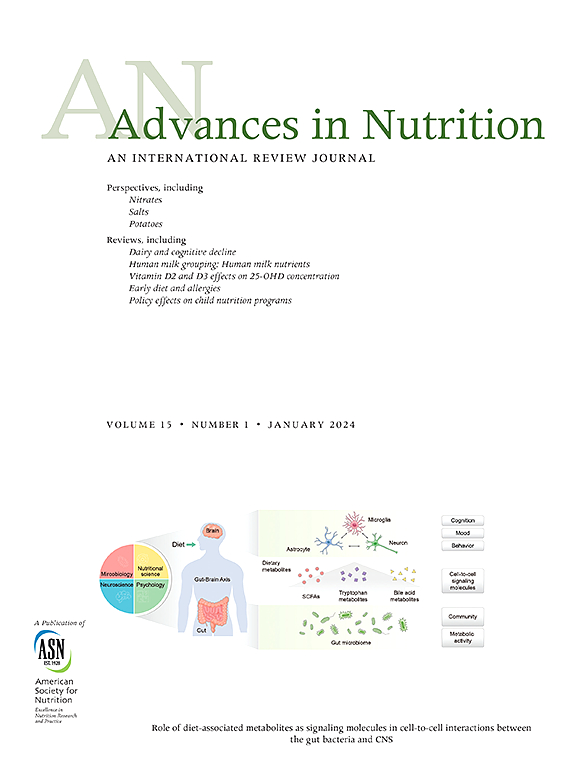Artificial Intelligence in the Management of Malnutrition in Cancer Patients: A Systematic Review
IF 9.2
1区 医学
Q1 NUTRITION & DIETETICS
引用次数: 0
Abstract
Malnutrition is a critical complication among cancer patients, affecting ≤80% of individuals depending on cancer type, stage, and treatment. Artificial intelligence (AI) has emerged as a promising tool in healthcare, with potential applications in nutritional management to improve early detection, risk stratification, and personalized interventions. This systematic review evaluated the role of AI in identifying and managing malnutrition in cancer patients, focusing on its effectiveness in nutritional status assessment, prediction, clinical outcomes, and body composition monitoring. A systematic search was conducted across PubMed, Cochrane Library, Cumulative Index to Nursing and Allied Health Literature, and Excerpta Medica Database from June to July 2024, following the Preferred Reporting Items for Systematic Reviews and Meta-Analyses guidelines. Quantitative primary studies investigating AI-based interventions for malnutrition detection, body composition analysis, and nutritional optimization in oncology were included. Study quality was assessed using the Joanna Briggs Institute Critical Appraisal Tools, and evidence certainty was evaluated with the Oxford Centre for Evidence-Based Medicine framework. Eleven studies (n = 52,228 patients) met the inclusion criteria and were categorized into 3 overarching domains: nutritional status assessment and prediction, clinical and functional outcomes, and body composition and cachexia monitoring. AI-based models demonstrated high predictive accuracy in malnutrition detection (area under the curve >0.80). Machine learning algorithms, including decision trees, random forests, and support vector machines, outperformed conventional screening tools. Deep learning models applied to medical imaging achieved high segmentation accuracy (Dice similarity coefficient: 0.92–0.94), enabling early cachexia detection. AI-driven virtual dietitian systems improved dietary adherence (84%) and reduced unplanned hospitalizations. AI-enhanced workflows streamlined dietitian referrals, reducing referral times by 2.4 d. AI demonstrates significant potential in optimizing malnutrition screening, body composition monitoring, and personalized nutritional interventions for cancer patients. Its integration into oncology nutrition care could enhance patient outcomes and optimize healthcare resource allocation. Further research is necessary to standardize AI models and ensure clinical applicability. This systematic review followed a protocol registered prospectively on Open Science Framework (https://doi.org/10.17605/OSF.IO/A259M).
人工智能在癌症患者营养不良管理中的应用:系统综述。
背景:营养不良是癌症患者的一个重要并发症,根据癌症类型、分期和治疗,影响高达80%的个体。人工智能(AI)已经成为医疗保健领域一个很有前途的工具,在营养管理方面有潜在的应用,可以改善早期发现、风险分层和个性化干预。目的:本系统综述评价人工智能在识别和管理癌症患者营养不良中的作用,重点关注其在营养状态评估、预测、临床结局和体成分监测方面的有效性。方法:系统检索PubMed、Cochrane图书馆、护理及相关健康文献累积索引和医学摘录数据库,检索时间为2024年6 - 7月,检索时间为系统评价和meta分析指南的首选报告项目。包括基于人工智能的营养不良检测、身体成分分析和肿瘤营养优化干预的定量初步研究。使用乔安娜布里格斯研究所(JBI)关键评估工具评估研究质量,并使用牛津循证医学框架中心评估证据确定性。结果:11项研究(n= 52228例患者)符合纳入标准,并分为三个主要领域:营养状况评估和预测、临床和功能结果、身体成分和恶病质监测。基于人工智能的模型在营养不良检测方面具有较高的预测准确性(AUC >0.80)。机器学习算法,包括决策树、随机森林和支持向量机,优于传统的筛选工具。深度学习模型应用于医学成像,分割精度高(Dice Similarity Coefficient: 0.92-0.94),能够早期发现恶病质。人工智能驱动的虚拟营养师系统提高了饮食依从性(84%)并减少了计划外住院。人工智能增强的工作流程简化了营养师转诊,将转诊时间缩短了2.4天。结论:人工智能在优化癌症患者的营养不良筛查、身体成分监测和个性化营养干预方面显示出巨大的潜力。将其整合到肿瘤营养护理中可以提高患者的治疗效果,优化医疗资源配置。规范人工智能模型,确保临床适用性,需要进一步研究。协议注册:10.17605/OSF。IO/A259M意义声明:本系统综述通过展示人工智能在营养不良检测、身体成分监测和个性化饮食干预方面的卓越准确性,强调了人工智能在肿瘤营养领域的变革潜力。与以往专注于孤立的人工智能应用的研究不同,这项工作全面评估了多个临床领域的人工智能驱动模型,强调将其整合到常规癌症护理中,以提高早期发现、治疗个性化和患者的整体预后。
本文章由计算机程序翻译,如有差异,请以英文原文为准。
求助全文
约1分钟内获得全文
求助全文
来源期刊

Advances in Nutrition
医学-营养学
CiteScore
17.40
自引率
2.20%
发文量
117
审稿时长
56 days
期刊介绍:
Advances in Nutrition (AN/Adv Nutr) publishes focused reviews on pivotal findings and recent research across all domains relevant to nutritional scientists and biomedical researchers. This encompasses nutrition-related research spanning biochemical, molecular, and genetic studies using experimental animal models, domestic animals, and human subjects. The journal also emphasizes clinical nutrition, epidemiology and public health, and nutrition education. Review articles concentrate on recent progress rather than broad historical developments.
In addition to review articles, AN includes Perspectives, Letters to the Editor, and supplements. Supplement proposals require pre-approval by the editor before submission. The journal features reports and position papers from the American Society for Nutrition, summaries of major government and foundation reports, and Nutrient Information briefs providing crucial details about dietary requirements, food sources, deficiencies, and other essential nutrient information. All submissions with scientific content undergo peer review by the Editors or their designees prior to acceptance for publication.
 求助内容:
求助内容: 应助结果提醒方式:
应助结果提醒方式:


